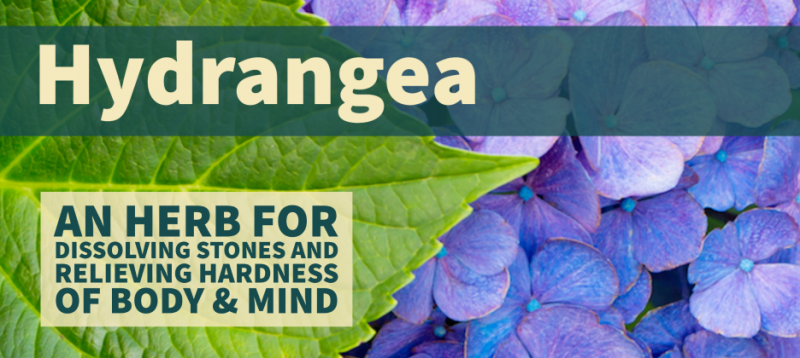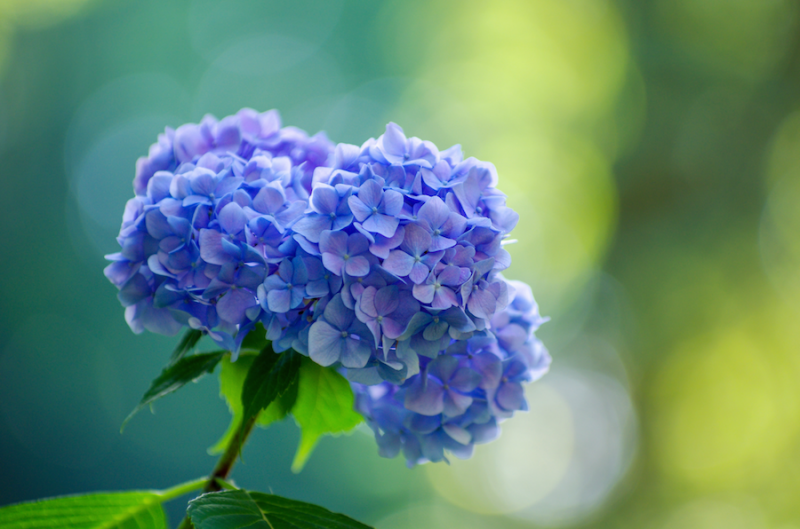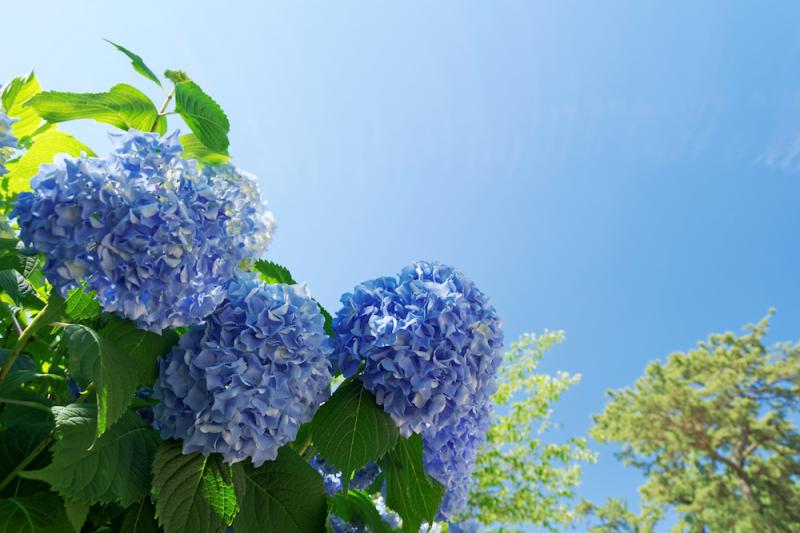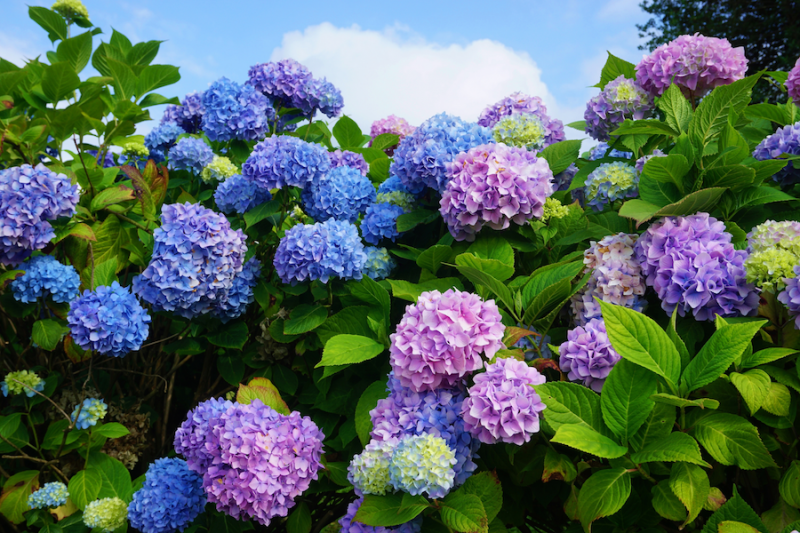
I’ve never had a kidney stone, but people who have had them know they are extremely painful. Fortunately, I’ve found it is possible to help someone pass kidney stones more easily with hydrangea.
Hydrangea is a hardy bush with beautiful flowers that make it a popular garden plant. And while there are around 75 species, most of them are mildy toxic. The only species that is used is for herbal medicine is Hydrangea arborescens and the part that is used is the root.
Passing Kidney Stones
 A basic program I’ve recommended to people that seems to work quite well for passing stones uses hydrangea along with lemon juice and distilled water. I learned about the lemon juice and distilled water from someone in Australia. You juice four fresh lemons (the Appalachian herbalist Tommy Bass suggested ten) and add the juice to a gallon of distilled water. Drink this water throughout the day while fasting. The amount of hydrangea taken will affect how fast the stones dissolve. I recommend taking 1-2 capsules of hydrangea every two hours, but some herbalists have had good results with taking up to 4 capsules hourly.
A basic program I’ve recommended to people that seems to work quite well for passing stones uses hydrangea along with lemon juice and distilled water. I learned about the lemon juice and distilled water from someone in Australia. You juice four fresh lemons (the Appalachian herbalist Tommy Bass suggested ten) and add the juice to a gallon of distilled water. Drink this water throughout the day while fasting. The amount of hydrangea taken will affect how fast the stones dissolve. I recommend taking 1-2 capsules of hydrangea every two hours, but some herbalists have had good results with taking up to 4 capsules hourly.
I've seen great results with this program and my herbalist friend and co-author of Modern Herbal Dispensatory, Thomas Easley, reports that he was able to observe the stones of someone on this program being dissolved through a medical imaging device. That happened in just five hours. Between my personal experience and the historical data I've seen I'm confident using hydrangea, but there is even some scientific backing for using hydrangea, read A Case of Multiple Treated Hydrangea Arborescens from the 2018 International Journal of Science and Research.
Lithotriptic Diuretic
A lithotriptic is an agent that helps keep calcium in solution and hydrangea’s lithotriptic properties are not limited to kidney stones. It can help with calcium deposits anywhere in the body, including problems like bone spurs. For example, I worked with a young man who had calcification of the muscles. I had him take an Oral Chelation Formula along with hydrangea and the calcification cleared up in a couple of months.
Hydrangea is also a diuretic that can help with fluid retention, urinary tract infections, and other urinary problems. It’s also been used to help with prostate problems. In addition to being a diuretic, it also has anti-inflammatory actions due to a cortisol-like effect. The adrenal glands, which sit atop the kidneys, produce cortisol to reduce inflammation and are involved in urinary function and fluid/mineral balance. They are part of the Chinese water element and the kidney qi.
Hydrangea and Flexibility
 The Chinese concept of the water element is related to fluidity; it encompasses the flexibility of the body and the personality. A person with too much water energy is wishy-washy, while a person with a deficiency of water energy is inflexible and brittle. The kidney qi builds the bones according to traditional Chinese medicine and is involved with structural issues.
The Chinese concept of the water element is related to fluidity; it encompasses the flexibility of the body and the personality. A person with too much water energy is wishy-washy, while a person with a deficiency of water energy is inflexible and brittle. The kidney qi builds the bones according to traditional Chinese medicine and is involved with structural issues.
This fits into Dorothy Hall's description of a person who needs hydrangea. In her book, Creating Your Herbal Profile, she says that someone who needs hydrangea is hanging onto resentments and old hurts, which can fill them with bitterness and cynicism. The hydrangea person is also quick to be on the attack, harping on the faults of others, getting them before they can get me. Their constant tendency to hold onto things and attack others creates a hardness in their personality.
Hall says this hardness can affect the face causing a fixed facial expression and a twisted mouth. She then states, “The wholistic view is that it’s impossible to have a hard attitude of mind without creating rock-like changes too. Bitterness and resentments about the past (or the present) may bring gall stones, kidney stones, bladder gravel, etc., as their physical manifestations.” In other words, hydrangea helps such a person let go of the past and bring more flexibility to the body and mind, something that definitely relates to the Chinese concept of deficient water energy.
Specific Indications
 Some specific physical indications that hydrangea may be helpful include: sediment in the urine, high levels of phosphorus in the urine, painful urination, frequent urge to urinate with difficulty starting urination, and urinary spasticity. Backache may be another indication, along with arthritis, gout, or rheumatism. For most of these problems, I’d use hydrangea as part of a formula or along with other remedies.
Some specific physical indications that hydrangea may be helpful include: sediment in the urine, high levels of phosphorus in the urine, painful urination, frequent urge to urinate with difficulty starting urination, and urinary spasticity. Backache may be another indication, along with arthritis, gout, or rheumatism. For most of these problems, I’d use hydrangea as part of a formula or along with other remedies.
Of course, you can also plant hydrangea in your garden and just enjoy its beautiful flowers but even that may be an act of healing the soil. According to the article Hydrangea, Color and pH, hydrangea helps to neutralize excessive aluminum in the soil. Too much aluminum in the soil adversely affects soil pH and can make it difficult for plants needing a more acidic pH to grow.
The hydrangea flowers are naturally pink in both acid to alkaline soil (pH from 5-8), but turn blue if the soil is high in aluminum. This is especially true if the soil is acidic and there is too much aluminum present. That makes me wonder if hydrangea might also be helpful for removing aluminum from the body. If anyone wants to try this, I'd recommend using it with horsetail or other remedies high in silica, which aluminum displaces in the body. If you do try it, let me know if it helps.
Downloads
Steven's Articles
-

-
Barberry and Healthy Personal Boundaries
A thorny shrub for fighting infections and supporting…
December
-

-
The Evidence for Berberine
A yellow alkaloid found in traditional infection-fighting…
-

-
The Sensible Use of Caffeinated Herbs
Kola nuts, guarana, and yerba mate and other herbs…
-

-
The Health Benefits and Problems with Coffee
This popular caffeinated beverage can be beneficial…
October
-

-
Understanding Caffeine & Cellular Adaptation
Preserving the power of caffeine's buzz and the…
September
-

-
Horseradish
A pungent spice for aiding protein metabolism…
-

-
Banaba or Crepe Myrtle
A beautiful tree from Southeast Asia whose leaves…
August
-

-
Monkeyflowers
Flower essences to help see ourselves more clearly…
-

-
Mariposa Lilies
Strengthening the bond between mother and child…
-

-
The Noble Bay Leaf
A common kitchen herb for aiding digestion and…
-

-
Epimedium: Horny Goat Weed
A circulatory stimulant and kidney yang tonic…
July
-

-
The Medicinal and Nutritional Benefits of Apricots
A nutritious fruit and valuable medicinal seed for coughs
-

-
Dogwoods
Asian dogwood is used to stop excessive discharge,…
June
-

-
Neem: The Village Pharmacy
A popular Ayurvedic remedy for dental and immune…
-

-
Spilanthes: The Toothache Plant
A traditional remedy for teeth and gums, as well…

